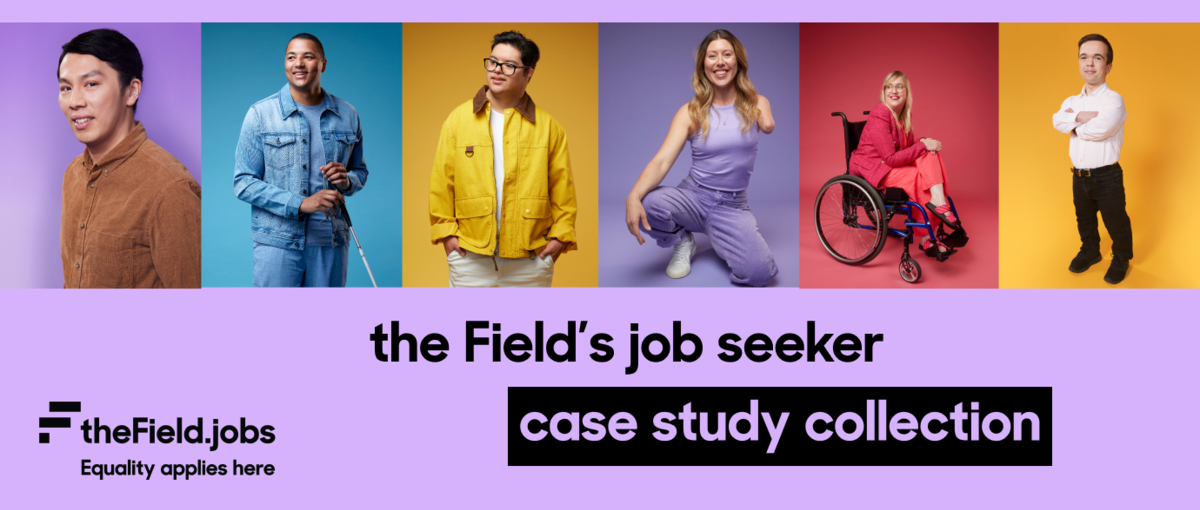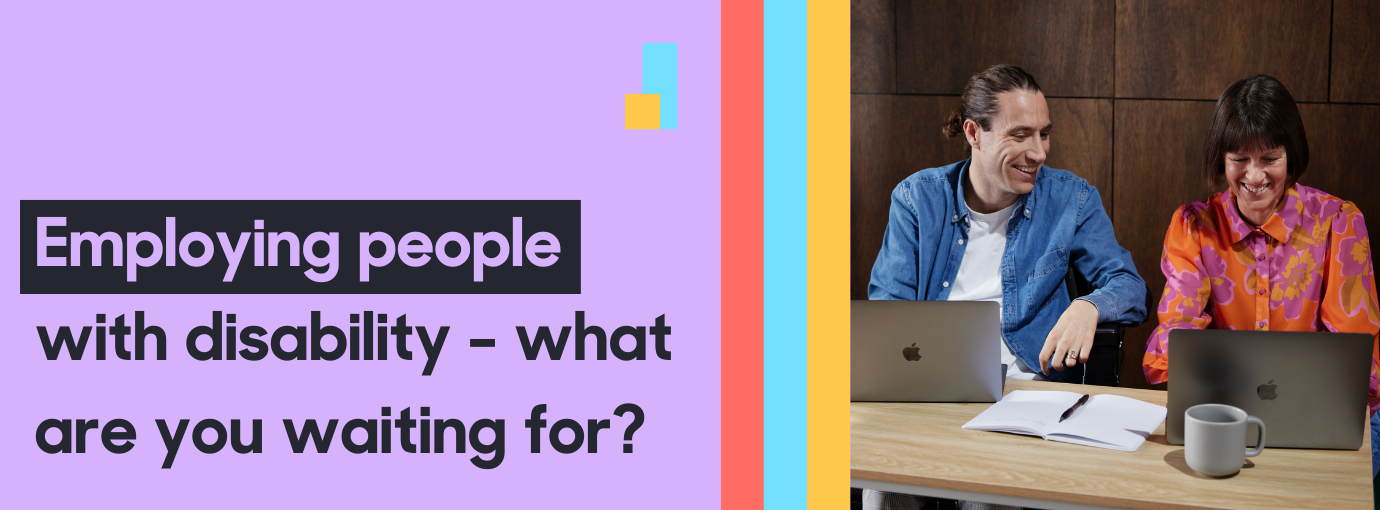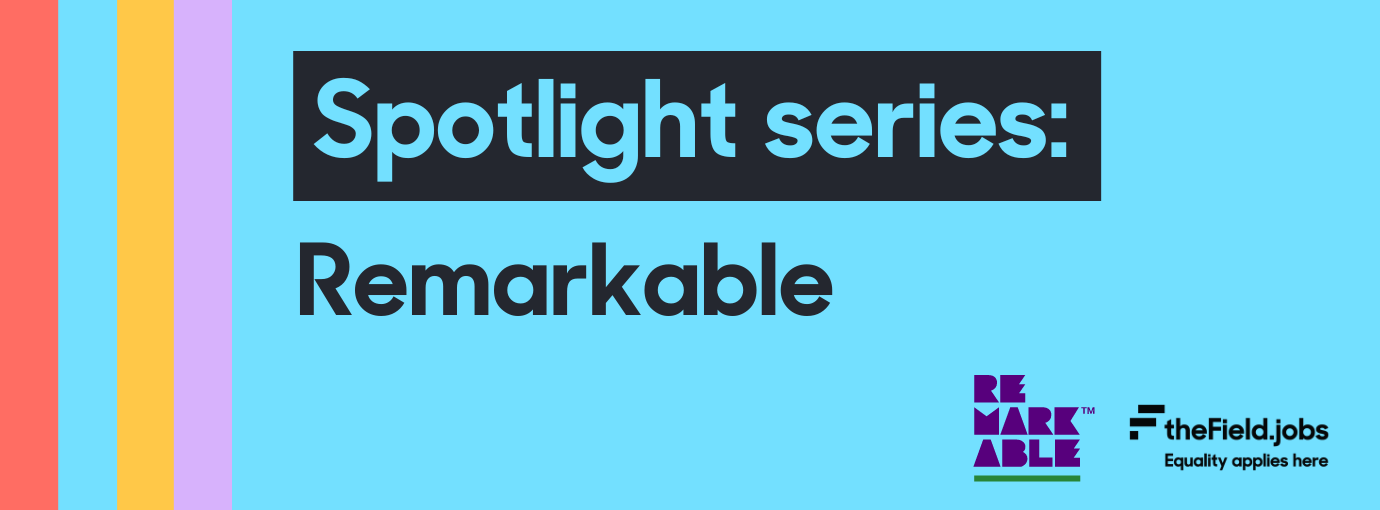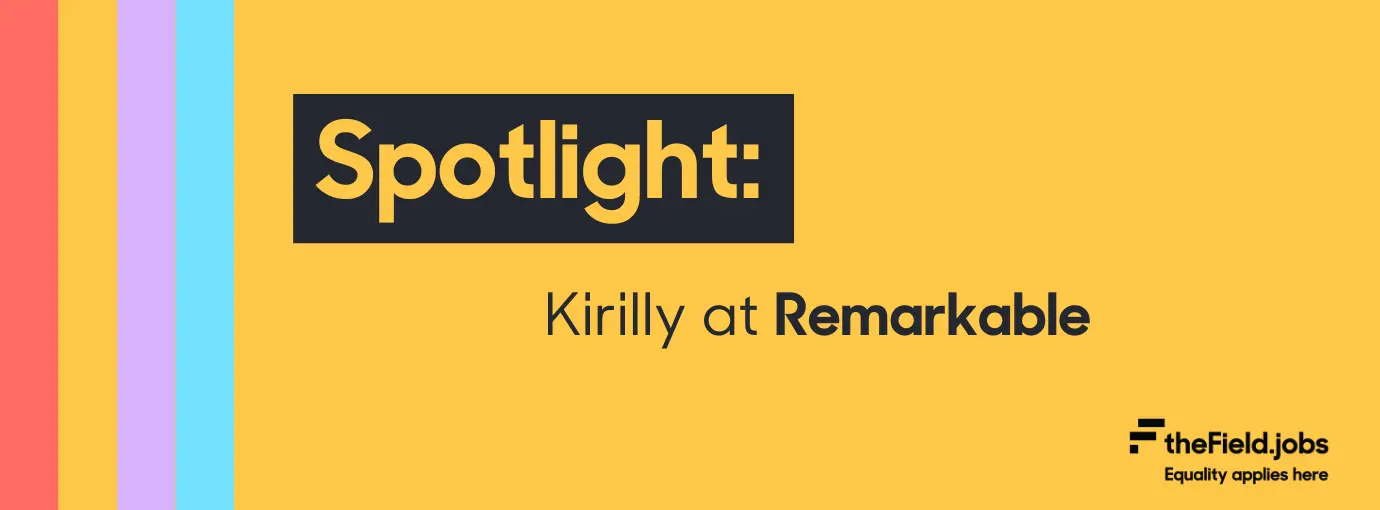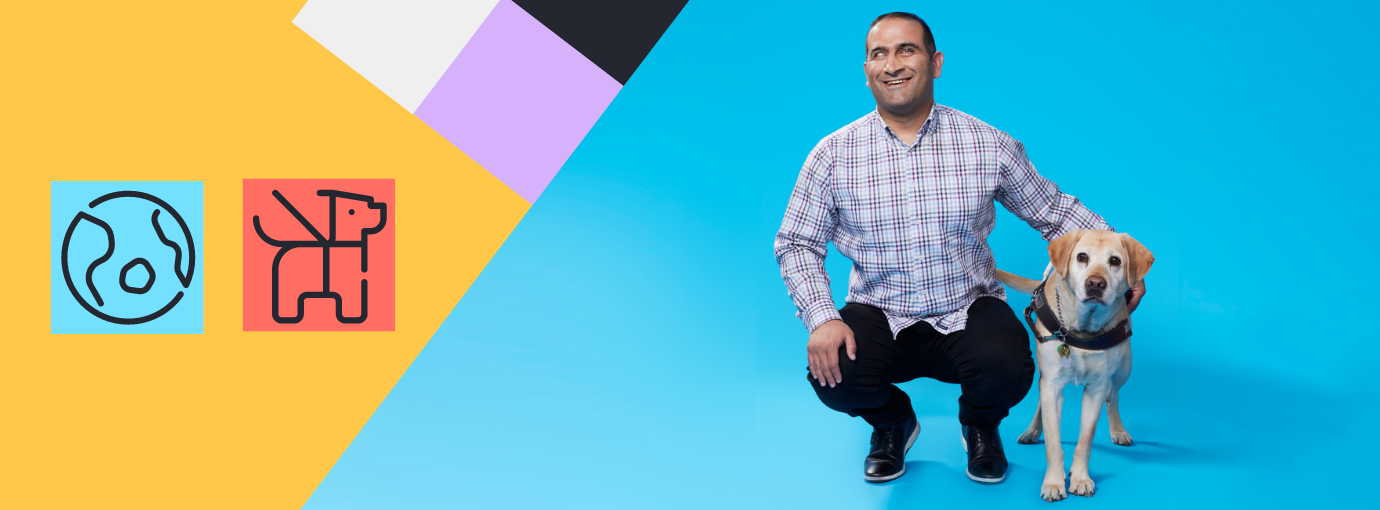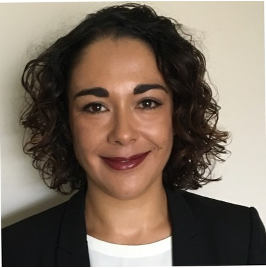
Case study 1: Employed on the Field Project Officer APS5 at NDIA (NDIS).
Rachel is a 50-year-old woman living with a hearing impairment (Rachel’s words) in Victoria, Australia. In this case study, we will explore Rachel’s experience finding employment with the National Disability Insurance Agency (NDIA) via the Field job site, her previous challenges in finding employment, and her tips for Job Seekers and Employers.
Background
Rachel found the Field through a disability advocate’s social media page, which led her to successfully apply for a Project Officer APS5 role at NDIA. Rachel has always valued employment as key to her independence and being able to afford to participate in the world, however she has faced a number of barriers to employment, and in many cases, hasn’t felt comfortable disclosing her disability.
Barriers to employment
Unfortunately, challenges in gaining employment are all too familiar for Rachel, due to an ongoing lack of understanding and patience from previous employers. She also noted that in her experience, the stigma attached to having disability is much more prevalent in the corporate world. However, she is hopeful that there will be more awareness after the pandemic, and that employers will become more open to employing people with disability moving forward.
“I definitely haven’t felt this comfortable disclosing and discussing my disability with previous employers. Some of that is down to me, but more so due to the lack of understanding and lack of patience I’ve experienced previously.”
the Field experience
the Field job site experience is vastly different from other job sites she has used previously. She noted that the job advertisements “…had more information about accessibility and flexibility available” and that job advertising from organisations was “…a lot more open to employing people with disability”. She added that “setting up my profile on the Field was really straightforward and I got helpful emails with information, as well as job alerts, pretty much straight away.”
When it comes to searching for jobs on the Field, Rachel noted “the additional accessibility filters are great & they have lots of options! You can add them separately to standard job filters too”. For Rachel, the filters allowed her to use the search function to find jobs that met her specific accessibility requirements. She also found the site easy to use, and felt supported by resources, such as suggestions about writing a cover letter. The free online information sessions for job seekers were an additional resource she found helpful when searching and applying for jobs.
The interview experience for this role at NDIA was a positive one, with a panel format interview and the questions provided to Rachel ahead of the interview. The team at NDIA were “…very accommodating. I was provided the questions 30mins beforehand and the questions were typed into the chat function during the interview, which was really helpful”.
She received a job offer via email and discussed the details with her new manager before accepting and submitting the paperwork.
Tips for job seekers
Rachel recommends job seekers start searching with the Field job site, and more specifically, look for employers that talk about accessibility, workplace adjustments, and available support. She adds that job seekers should check out an employer’s website and talk to people with disability to see what they know about the organisation.
“Well obviously start with the Field! Look for employers that talk about accessibility and accommodations and supports from the very start, check out their websites and talk to people who are disabled to see what they know (social media groups are great for this) And most importantly, don’t give up!”
The value of employment
Rachel considers employment as key to everything, as it provides her with independence, the ability to participate in society, choice and control in what she wants.
“Honestly, it is everything – my independence is the main thing but being able to afford to participate in the world and do the things that I want is life changing.”
Advice for employers
She strongly encourages employers to understand the benefits of diversity, and the importance of fostering an inclusive culture across all levels. She stresses the importance of language, including talking about accessibility and workplace adjustments from the start, as a key component for organisations wanting to attract a wider range of applicants. She adds that many people have non-visible disabilities, and an open and supportive work culture can encourage them to be more open about what they need to succeed.
“Diversity is everything and words really matter! If you don’t have people with disability in your workforce, you risk missing out on all the great ideas, creativity and contributions from a large part of the community.”
Conclusion
Rachel’s experience highlights the importance of accessible and inclusive job sites, employer understanding of disability, accessibility and inclusion, and an open and supportive work culture for everyone, including people with disability. Her tips for job seekers and employers provide a useful starting point for creating a more inclusive recruitment space.

Case study 2: Employed on the Field Accessibility Support Team for the Rolex Formula 1 Australian Grand Prix 2023
Anonymous, a 21-year-old male from Victoria, Australia, has an acquired brain injury and was looking for a job. He found out about the Field at the Melbourne Disability Expo and signed up the following week. He was motivated to apply because he is a fan of Formula 1.
The hiring process
the Field experience
Getting a job through the Field was more positive from his past experiences looking for work on other job sites. the Field’s purpose-built platform for people with disability has added accessibility features, which made it easy to apply for jobs.
He found the Field to be accessible and inclusive. In particular, he liked with high contrast screens and clearer application instructions, which made the process streamlined. Overall, his experience using the Field was positive, and he would use it again.
Employment experiences
He mentioned a few previous positive employment experiences, particularly at Taco Bell and McDonald’s. In both instances, regular check ins with supervisors, and the presence of his support workers in the workplace created an environment where he felt comfortable.
“Taco Bell and McDonalds. Support workers allowed to be on-site. Put my where I’m comfortable.”
Advice for employers
When asked what he would say to employers thinking about hiring people with disability, Anonymous encouraged them to give people a go.
Conclusion
The successful hiring of the Accessibility Support Team through the Field for the Rolex Formula 1 Australian Grand Prix 2023 demonstrates the platform’s inclusive approach to employment, and highlights the value that people with disability can bring to the large events space

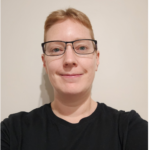
Casy study 3: Becki Greene's experience finding employment through the Field
Becki Greene is a 37-year-old woman from Victoria. She has Relapsing Remitting Multiple Sclerosis and High Functioning Asperger’s (otherwise known Autism Spectrum Disorder or ASD). Becki applied for a job on the Field as a Customer Service Specialist at Mable. Becki shared her experience finding employment through the Field and how it differed from her previous job searching experiences.
Background
Becki found the Field through social media and Facebook. “I was tired of either pretending I wasn’t disabled, or hiding it.” She wanted to find a role and employer that would suit her needs and accommodate her disabilities and access requirements. Using the Field for her job search was the first time she had come across a job site that had employers who were purposefully inviting people with disability to apply.
“I felt more comfortable knowing that they know that they’re interviewing, and in the end, employing someone with a disability, and that’s a huge thing.”
Barriers to employment
Becki had faced barriers to gaining employment in the past. These included the constant perceived pressure to pretend to be neurotypical, hide her disabilities, and worry about how and when to disclose her disabilities to employers. She did get an interview with one local business through another job site, however found it too much stress to keep her disability hidden.
“The constant pretending to be normal, the constant pretending to try and fit in and constantly appear normal, and healthy and, you know, neurotypical, it was constantly in the back of my mind, like, well, when are you going to tell them? What are you going to say to them? How are you going to tell them? How accepting are they going to be?”
the Field experience
Becki applied for the job online, and she found the profile creation process on the Field very easy, and she liked that she only had to include the information she felt comfortable disclosing. She was also able to filter the job search to find what she was looking for. Becki went through three interviews with Mable and an assessment. She met with people who are now directly involved in her day-to-day role or team, including her supervisor, manager, and senior manager which has made a big difference in onboarding.
Becki particularly liked the filters on the Field and appreciated the ability to filter jobs to her specific accessibility preferences. Becki appreciated that the Field and the employers on the platform knew they were inviting people with disability to apply, making it easier to be herself during the interview process. She found the best part about the job site was the inclusiveness of people with disability to be their authentic self and the choice to disclose her disability.
“I’ve recommended you guys, or recommended the Field to a lot of people, [including in] my local community and on social media. “Here is a platform for you that is catered to people with disabilities”. So, you don’t have to stress about disclosing, you don’t have to stress about trying to be healthy and normal or neurotypical”.
The value of employment
“You shouldn’t be living to work, you should be working to live.”
Tips for job seekers
“Look for a job that’s going to suit you. That’s going to work for you. Don’t look for any job or just settle for anything.” Becki reiterated that the most successful job seekers actively seek positions that align with the goals and values of an employer. Rather than settling for any job, people should focus on finding opportunities that genuinely resonate with them, where they can bring their true self.
“When you are really you in your interviews, your passion, and your confidence automatically come out. Because if you’re being truthful, you don’t have to pretend because you do want to work for the company. You do want that job, you genuinely do. So that’s my advice basically is go for a job that suits you.”
Advice for employers
It’s important for employers to recognise that individuals with disability have unique skills and perspectives that can enhance a workplace. Educate and build capability and confidence in disability and workplace adjustments that can help employees with disability succeed in their roles.
“Be open minded. Educate yourself. Don’t just go on stigmas and stereotypes. That and, well, people with disabilities, yes, we may have disabilities, but we also still have abilities and many of those abilities are just as good, if not better than a person without disabilities.”
Conclusion
Overall, Becki’s experience being hired on the Field was positive. She appreciated the inclusive features of the platform, including the ability to filter jobs and the comfort in knowing that employers were purposefully inviting people with disabilities to apply. This allowed Becki to feel comfortable and be herself during the interview process and she is now excited to be in a job she loves at Mable.
Register on the Field now to apply for new jobs or post new job opportunities.
